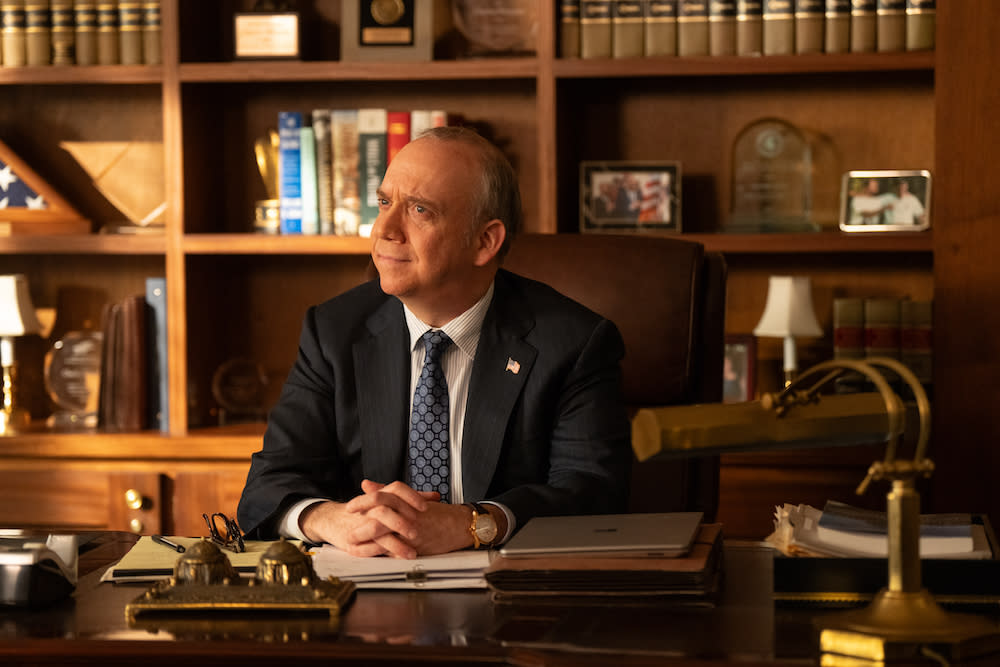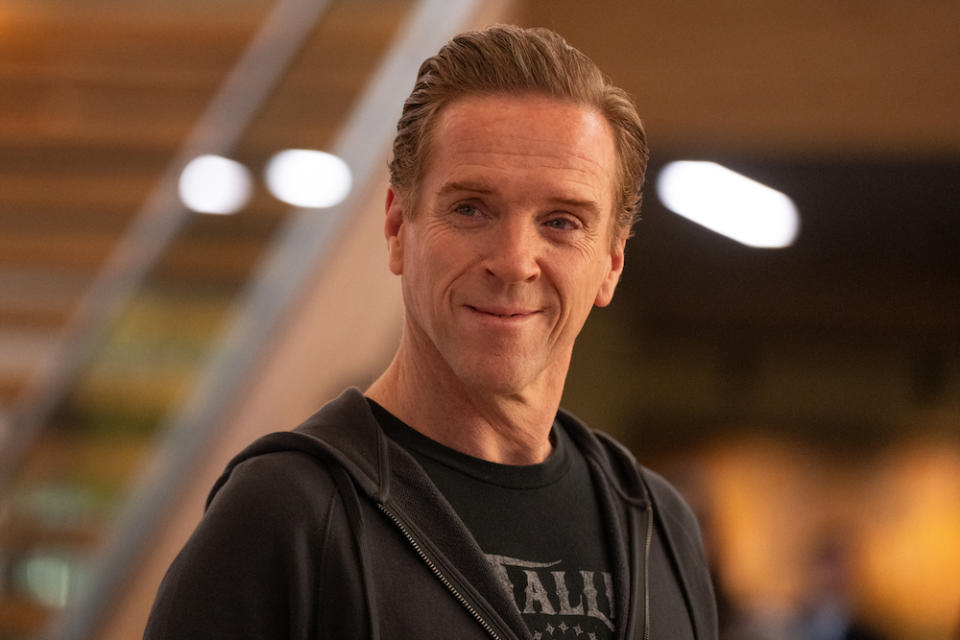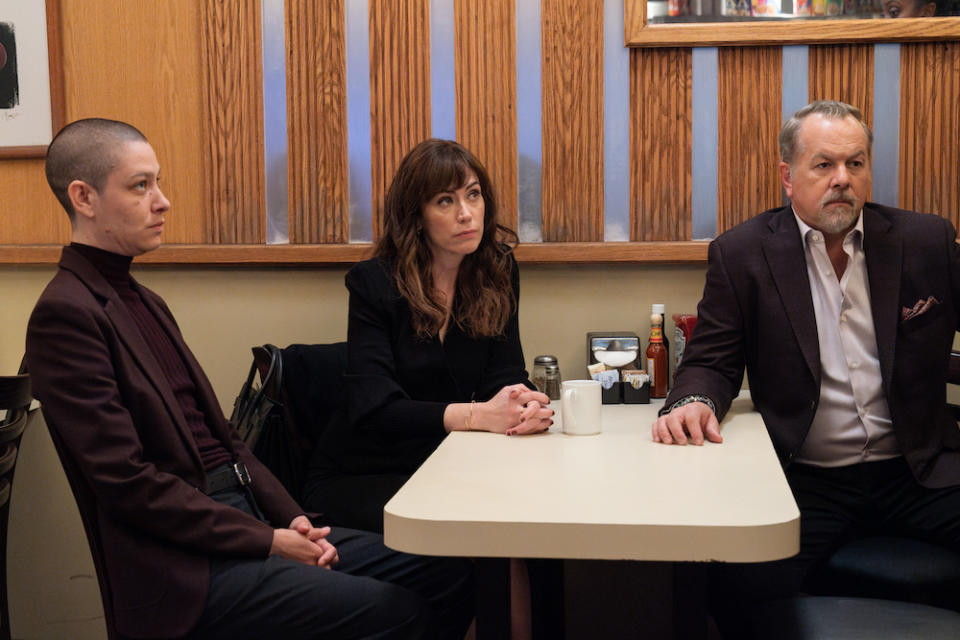‘Billions’ Creators Break Down Dual Forces Driving the Series Finale: ‘Their Souls Are in Peril’

- Oops!Something went wrong.Please try again later.
- Oops!Something went wrong.Please try again later.
- Oops!Something went wrong.Please try again later.
[Editors Note: The following interview contains spoilers for the “Billions” finale, Season 7, Episode 12, “Admirals Fund.”]
“Billions” ends not with one man reigning supreme, but two titans shaking hands. Chuck (Paul Giamatti) and Axe (Damian Lewis) joined forces early in Season 7 and — despite a history filled with trickery and betrayal — remain loyal to the very end. Along with their devout team of stock traders and political savants, the duo takes down Mike Prince (Corey Stoll) and his bid for the presidency, before parting ways as friends. Chuck will continue working for the state of New York, while Axe is back behind the soon-to-be sleek desk of his hedge fund.
More from IndieWire
For a series that began with promises by both men to utterly destroy the other, some fans may be miffed that neither star is crowned as champion. But for showrunners Brian Koppelman and David Levien, the “Billions” series finale isn’t all sunshine and rainbows. It’s an embodiment of what the series has been all along: a massively entertaining reflection of the way the world works. For every cheery, satisfied smile, there’s deeper meaning tucked within the folds. So IndieWire dialed up the co-creators to break down the ending, the final season’s big swings, and how they managed to fill “Billions” with so much beautiful music.
This interview has been edited for length and clarity.
IndieWire: For the final season, when and why did you decide it would be best for Chuck and Axe to team up, rather than go after each other?
David Levien: We felt like the real mano-a-mano thing between Chuck and Axe reached its fullness during the end of Season 5, where neither guy lost completely, but neither guy won completely. It was like pure victories and standoffs and grudging respect for the opponent who played you to your very end. Then over the course of the sixth season, as Mike Prince started to reveal the darker hues of his character and how he could be a danger, we realized we had a formidable enough foe that these others could team up against him. In a certain way, that’s the most fun because the barbing is still there, but they have a common cause.
What did you hope fans would be left thinking about?
Brian Koppelman: Pobably in that Wendy [Maggie Siff] and Taylor [Asia Kate Dillon] leave, and Rian [Eva Victor] leaves. It seems to me we feel pretty good about the fact that they leave, and that Sacker [Dola Rashad] understands where Sacker needs to be. Scooter is a very important character to us. Daniel Breaker’s a genius, and Scooter says what he says to Prince [quitting to consider when and how their moral compass went awry], and he is going to do what he’s going to do. To us, we tried to get each of them a moment where the audience can think about what it means for their trajectory from this moment forward.
From the jump, the last episode leaves little doubt that Chuck and Axe are going to win. How did you decide on that approach, that tone, for the finale, rather than teeing up a big reversal or twist as in past seasons?
Levien: If it were a season finale and we were doing this, then we could have dedicated half of the real estate toward the Prince side of the reversals, but we had to devote the other half of the real estate to the valedictories and the goodbyes. So we made the conscious decision for them to have this attitude, right from the beginning, that the outcome’s not in doubt. Basically, once they securely got Prince into Camp David without his phone, with no contact to the outside world, they knew how the rest of the dance steps were going to unfold. We didn’t want to drag that out and then have all these characters that we’d been with for seven seasons not get to have resolution on a character level.
Koppelman: Two things: 1. If you’re watching the show, you know Prince ain’t winning. So to [make it appear otherwise] felt disingenuous to the audience. Between the penultimate and ultimate episodes each season, we could fuck with it, but this is the end, so they’re going to win. 2. I would say this, Ben: On a plot level, 100 percent, you’re right. We made the decision to let you know who the winners and losers are going to be. But there’s something else that’s been going on the whole time. The show has a lot of morality questions underpinning it, and so their souls are in peril for a lot of this episode.
This is one of the tricks about the show, right? From Season 1, people viscerally bonded with this guy, Axe, because of his backstory and because of the corrupt forces that were after him. So viscerally, they hung with him, even though he let Donnie die and all this stuff. What we hope happens is that one asks oneself, “Why do I feel this way about this guy? What does that say about the world we’re living in? And about the value system we speak versus the value system that we actually feel and live? So Bobby Axelrod, for all this talk about freedom, where’s he end up and what does he say as his final line? [Axe ends up running Axe Capital again, and his final line is to his employees: “Let’s make some fucking money.”]
So it’s working on this level, but it’s also working on that level. We have this thing about our work: People often misread it early on, but we’ve had a long enough run that eventually it lands. So, some people had to review “Super Pumped” on only five episodes, but if they watched the last two episodes, they would know that it was about something else. We accept all that. What we write is entertaining and some people want to indict us for it being entertaining, but we are interested in these moral questions. It’s in our work. It’s in everything from “Rounders” to “Knockaround Guys” to “Solitary Man” to “Billions,” even to “Tilt.” It’s just in there. Ultimately, we think people will figure it out, but we want to entertain, too. It’s important to us that it’s entertaining and that it’s not work.

These days, there’s so much to watch and so much emphasis on trying to get through everything. You kind of have to hope everybody processes not just what happens, but what it could mean, before auto-play pulls up the next show in their queue. We all need time to let stuff settle in, and the “too much TV” era doesn’t always encourage that kind of contemplation.
Koppelman: It takes time. In doing this, you have a choice between spoon-feeding [points] to the audience and just choosing to trust they’ll appreciate them over time. The immediate moment we live in makes it hard. It makes it really hard. But I go back and watch shows all the time, and so does he, and so do our friends, and so do you. We all do it. Then, five years later, you notice something new and go, “Oh fuck.” That’s a great thing, and we’re comfortable [with it.] We made indie movies for a lot of our careers, so to us, the fact that we’ve developed an audience that’ll watch this shit is amazing and thrilling. Yeah, the plot is one thing, but the other stuff at stake matters as much to us, and we hope eventually it does to everyone else, too.
Levien: There’s also just the mechanics thing of the audience learning how it happened. It should be very satisfying for them, even if they have a lean on which way it may work out. That’s something that we came to understand heavily when we were writing “Oceans 13” and working on it with [Steven] Soderbergh. Because that’s not a movie where you’re wondering if George [Clooney], Brad [Pitt], and Matt [Damon] are going to win or lose. They’re probably going to pull it off. But it’s like, “How are you going to get there? How are you going to turn the cards over to delight the audience?”
Koppelman: That scene in “Oceans 13” when the guys are by the Bellagio Fountains — early in it, not the end — I remember George really talking about finding these little moments where you understood why it mattered to these guys. It was great. Hearing George talk out the way he thought about character has stayed with us for a long time. Within these entertaining things, you can find ways to land something significant — you hope.
Given the significance of music in “Billions,” how long have you known your final song was going to be “Take the Money and Run”?
Koppelman: Did it work for you?
It did. I thought it matched the vibe of the episode and leaves the audience on the upswing.
Koppelman: That’s what we think, too. We think a lot about the music, and we wrote the song into the script. The two of us are sending songs and playlists back and forth all the time, and we’ve been like brothers since we were 15, so the resonance the songs have are similar for the two of us. It’s not that we thought of it so long ago, but when we thought of this song, the moment one of us said it to the other, it was like, 100 percent. There was no doubt.
Levien: We can’t say we thought of it when we were making the pilot. It’d be very cool if we had, but we weren’t driving toward this the entire time.
Koppelman: But it is always satisfying when you write them into the script and then it works as well as you hoped. It goes to the heart of this final season. We really were thinking about “Billions” obsessive fans this season. We decided that that’s who we are, and we wanted to make the show for folks who cared a lot about the characters, the world of the show, the language of the show. The show exists in a slightly canted world — even though we never cant the camera — and that song exists in that kind of space, too. So it all kind of felt like it worked together.
This may be a question just for me, but how often were you able to write songs into the script and actually get the music? Because the licensing, the budgets, all of that can be such a pain in the ass.
Levien: We didn’t run into that problem. Maybe it was just an instinct thing, but we would write some big ticket songs into the scripts and then sometimes they’d be very obscure songs, so it tended to balance out.
Koppelman: But also I would say right from the very beginning, we went to Showtime and said, “Look, we’re going to use music in a certain way. Let’s know going in how important the music’s going to be. Let’s have a music budget that allows us to take those shots during the year. We’ll manage it. If we’re going to hit the hard ceiling, we’ll call you way in advance.” And then they did a really cool thing. Not every network does this, but Showtime came to us and they said, “Any product placements you do on the show, we, Showtime, won’t take that money. You can use that money for songs.”
Oh, wow.
Levien: They said, “You can apply it to your show budget.”

Koppelman: So if you saw a car on the show and were like, “That seems like a product placement.” Well, that’s the money that got “In the Evening” by Led Zeppelin in the show. So our post-supervisor would tally [the budget] and go, “Here’s where we are. Here’s what the product placements are covering. OK, it’s going to be really easy to use that U2 song.”
Dave and I picked every song, so [our music supervisor] Jim Black didn’t have to worry about that, but what he was amazing at was the clearances. He built relationships over a long career and he expressed to people what music lovers we were. Then Jim would say to us, “Hey, to get this Neil Young song, if you really want ‘Old Man,’ you should write Neil Young a letter and I’ll get it to him. So we would write letters and they were earnest because we meant it.
Levien: We were putting [these songs] in because they mattered to us, so it was easy to express that to the artist.
Koppelman: We could describe to Neil Young, “Here’s what’s playing, here’s what’s at stake in this scene, here’s why we’re using the song. We think [our scene is] in the spirit of the song.” I remember doing that, and the next day they cleared the song for a very reasonable price.
Then the music business noticed that when we would feature a song in a certain way, that song did well that week. Then some artists became fans, or their managers did. “Atlantic City” was the first Bruce Springsteen song we [asked for], and we heard that he was reading the script on vacation. He went outside his place, and he was reading it. Obviously, that’s nerve wracking, but then we got word back [that we could use it], and when I met him a couple years later, he told us that he and Patti watched the show on Sunday nights.
Among the big swings in the final season, the restaurant montage at the start of Episode 9 stands out. What were the origins of that?
Koppelman: We had a suspicion that people might be moved by it, but it was beyond what I thought. That [montage] was written into the script. That song [“I’ve Loved These Days” by Billy Joel] was written into the script. Look, let me start from the fact that we’re two Long Island kids growing up, so that creates a certain association with Billy Joel and the way Billy Joel saw New York. We’d had that song saved for a while, for the last season, and Patsy’s is an incredibly important restaurant to us, so it’s got to start there. My dad started taking me to Patsy’s. My dad, who we dedicated the first episode of the season to, he passed away between Seasons 6 and 7. So Patsy’s matters a lot to us and what it means in New York. There are amazing stories about Sinatra and Patsy’s that are just mind-blowing.
Levien: So we were intending to use it in a meaningful way, and we were saving it
Koppelman: It led us to think, “OK, this is a moment to just give a hug to everybody, to say goodbye to the show together.” That’s what it felt like, and that’s what that restaurant kind of feels like. While writing that episode, one of my son’s friends, his dad had just passed away very close in time to mine, and I went to this kid’s dad’s funeral. Then on the way home I was alone, and I went to Patsy’s and I just sat at one of these tables by myself and texted Dave from there.
If you write something like [“Billions,”] it’s a part of you for so long. When he was writing this first novel years ago, before I was a writer, David said to me, “When you’re in a really good one, where it really feels like you’re connected to it, everything that happens in your life finds its way into the work in some way.”
“Billions” is available to stream in its entirety on Paramount+ with Showtime.
Best of IndieWire
Where to Watch This Week's New Movies, from 'The Holdovers' to 'The Killer' and 'Priscilla'
The 60 Best Sci-Fi Movies of the 21st Century, from 'Melancholia' and 'M3GAN' to 'Asteroid City'
Sign up for Indiewire's Newsletter. For the latest news, follow us on Facebook, Twitter, and Instagram.

